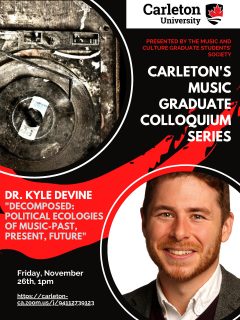Past Event! Note: this event has already taken place.
Colloquium Series – Dr. Kyle Devine
November 26, 2021 at 1:00 PM to 2:00 PM
| Location: | Location TBA |
| Cost: | Free |
On Friday, November 26th, the MCGSS Colloquium Series welcomes our distinguished guest, Dr. Kyle Devine, who will give a presentation titled “Decomposed: Political Ecologies of Music: Past, Present, Future” (Friday, November 26th, 1:00-2:00 pm). Our poster is attached, and both the Zoom-link and Dr. Devine’s biographical blurb are copied below. We hope to see some of you there!
“Decomposed:
Political Ecologies of Music: Past, Present, Future”
Dr. Kyle Devine
Associate Professor and Head of Research,
Department of Musicology, University of Oslo, Norway
Friday, November 26th, 1:00 pm
Zoom Link: https://carleton-ca.zoom.us/j/94112739123
Dr. Kyle Devine is an Associate Professor in the Department of Musicology at the University of Oslo, Norway. In 2012, after completing his PhD at Carleton University (ICSLAC), he subsequently worked as a Postdoc Fellow with the Music and Digitization Research Group at the University of Oxford (where he taught at Worcester College), and taught at City University London, where he was a Visiting Assistant Professor.
The following are excerpted from reviews of Dr. Devine’s Decomposed: The Political Ecology of Music (Cambridge, MA: MIT Press, 2019), Winner of the IASPM Canada Book Prize (2020):
“Did you know that the CO2 equivalents generated by consumption of recorded music have not declined in the era of music streaming―supposedly an era of music dematerialized, rendered virtual―but instead have as much as doubled? Kyle Devine knows, and in Decomposed he teaches us about such things with intelligence, humaneness, and passion. His book is at once a history of materialities of recording, from lac beetle resins in the 1920s to today’s energy-sump server farms, and a manifesto for ecological scrutiny of our musical behaviors.”
―Gary Tomlinson, John Hay Whitney Professor of Music & Humanities, Yale University
“Decomposed is a superbly lucid study that places recording in the broad human history of industrialization, globalization, resource extraction, labor exploitation, and ecological damage, debunking ideas of music’s inherent goodness or intangibility. An immensely rigorous and compelling study, an absolute must-read, this book paves the way for a new ethics of music consumption.”
―Anna Morcom, Mohindar Brar Sambhi Chair of Indian Music, University of California, Los Angeles
